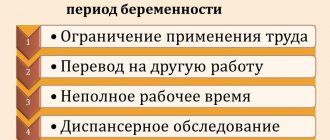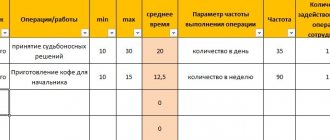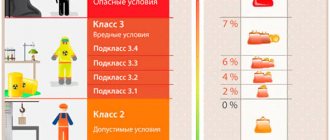What is rest time according to the Labor Code
Rest time for employees is defined as the period during which an employee can be released from duty. During the period of such rest, a person has the right to engage in personal affairs, regardless of his location. This feature is due to the fact that types of rest time include time intervals that arise as a result of the rights granted to the employee by the employer. Below we will dwell in more detail on the features of existing types of rest time.
Subject to the provisions of Art. 107 of the Labor Code of the Russian Federation, types of rest time include:
- day break;
- daily rest;
- weekend;
- days recognized as non-working days due to falling on holidays;
- vacation.
If you have access to ConsultantPlus, check whether you have provided the employee with the correct time to rest. If you don't have access, get a free trial of online legal access.
How to display vacation on the timesheet, read the article “Working time sheet on form T-12 - form.”
Concept of working time and rest time
Working time is the period intended for an employee to perform his work duties according to the company’s regulations.
The concept of rest time is established by Art. 106 Labor Code of the Russian Federation. Rest time according to the Labor Code is the interval in which a person is released from performing labor functions. Formally, rest time in labor law is a person’s stay outside his workplace. The employee has the right to use rest time at his personal discretion. During these periods, he can study, undergo treatment, fulfill family responsibilities, participate in political activities, go to the sea, etc. The purpose of rest is to restore the ability to work.
The right to rest is defined by the Constitution of our country. All types of rest time according to the Labor Code of the Russian Federation are included in the terms of employment contracts.
How long is the break during the working day?
This type of rest can last from 30 minutes to 2 hours, while the exact period is established by the employer’s internal documents. The specified time is allocated so that employees can:
- take a little break from work;
- have lunch.
This break increases the length of the working day, since it is not included in the calculation of hours worked. Exceptions are cases when:
- working conditions do not allow organizing time for such rest;
- Work is carried out at low temperatures, and there is a need for periodic heating, for which appropriate rest time is allocated.
We also suggest that you familiarize yourself with the issue of VAT taxation of the cost of lunches provided to employees in the material “How not to pay VAT on lunches? "
What does daily rest mean?
Daily rest, or break, is carried out by each employee after the end of the working day. This rest period lasts until the start of the next working day. Thus, its duration depends on the work schedule provided for by the employer’s internal documents. For example, if the local document of the organization stipulates that the working hours are from 9:00 to 18:00, then rest lasts from 18:00 of the current day to 9:00 of the next day.
Note that the Labor Code of the Russian Federation provides for the concept of “overtime work,” which means performing work duties after the end of the working day.
More details about the features of overtime work and the rules for its compensation are described in the article “How is overtime work paid according to the Labor Code of the Russian Federation?” .
Rest time from Saturday to Monday is typical for all employers
Often, many employers offer work on a five-day basis, in which working days are Monday, Tuesday, Wednesday, Thursday, Friday, and Saturday and Sunday are weekends. But the Labor Code of the Russian Federation does not define these two days as days off. According to Art. 111 of the Labor Code of the Russian Federation, with a 5-day working week, employees are allocated 2 days off, with the obligatory day being Sunday. The second day off may also be Monday, which is stated in the employer’s internal documents.
If the employer is on a six-day working week, then he has one day off. In cases where work processes cannot be suspended for the “classic” weekend from Saturday to Monday, employees have the right to take a weekly rest on various days provided for by the schedule and internal documents of the employer.
In this case, the continuous duration of such rest should be at least 42 hours. Note that this period is also fixed in some provisions regulating working hours and rest. For example, such a requirement is contained in clause 26 of the Regulations on the peculiarities of the working hours and rest periods of car drivers, failure to comply with which may lead to the application of administrative liability to a legal entity in the form of a fine from 30,000 to 50,000 rubles. according to Art. 5.27 Code of Administrative Offenses of the Russian Federation.
Please note that the law defines a special procedure for paying for work on weekends.
For more information about this, see the material “How to correctly calculate holiday pay and take it into account in expenses for income tax purposes .
The right to rest in labor law
The concept and types of rest time are contained in labor legislation. We are talking about the rules that the parties to the labor relationship adhere to. Working time and rest time are two different concepts that are taken into account by the employer when developing the daily routine and internal rules. It is believed that working time is the time when employees perform their work functions.
Its duration is determined by the collective agreement or other internal documents of the organization.
And rest time is time when an employee is free from work and can spend it at his own discretion. All employees without exception have the right to rest time between work shifts. Types of rest time are short-term and long-term rest.
Rest time is regulated at the state level. Labor legislation contains rules regulating the types of rest to which different categories of workers are entitled. They can count on breaks during the working day, rest between work shifts, days off and vacation. In addition, the employer is obliged to provide rest on holidays, which are considered non-working days by law.
Which days are non-working holidays?
Taking into account the norms of Art. 112 of the Labor Code of the Russian Federation, holidays include:
- January 1–8;
- February 23;
- March 8;
- May 1 and 9;
- 12 June;
- November 4.
Due to the coronavirus pandemic, the President of the Russian Federation declared the period from 03/30/2020 to 05/11/2020 non-working. Find out how to register these days and what nuances the HR manager and accountant should take into account in ConsultantPlus. If you do not have access to the system, get a trial online access and proceed to the Sample Situation for free.
It is important to note that working on holidays has a number of nuances:
- Employees are allowed to work on such days only with their written consent.
- It is mandatory to draw up a written order from the manager.
- Some employees may work on public holidays only if not prohibited by medical advice. This:
- disabled people;
- mothers of children under 3 years old;
- pregnant women.
- for piecework work, payment is based on 2 times the piecework rate;
- when working at a tariff rate - at least 2 tariff rates;
- if there is a salary - from the salary rate (if the work is within the monthly norm according to the Labor Code), in double the amount (above the monthly norm).
Read about the specifics of working on holidays in the material “Payment for holidays during a shift work schedule .
Concept and types of rest time
As a general rule, working on weekends and non-working holidays is prohibited. The law (Article 113 of the Labor Code of the Russian Federation) establishes an exhaustive list of cases that can serve as grounds for attracting employees to work on weekends and non-working holidays without their consent :
- to prevent a catastrophe, industrial accident or eliminate the consequences of a catastrophe, industrial accident or natural disaster;
- to prevent accidents, destruction or damage to the employer’s property, state or municipal property;
- to perform work the need for which is due to the introduction of a state of emergency or martial law, as well as urgent work in emergency circumstances, that is, in the event of a disaster or threat of disaster (fires, floods, famine, earthquakes, epidemics or epizootics) and in other cases posing danger threat to the life or normal living conditions of the entire population or part of it.
In other cases, engaging an employee to work on weekends and non-working holidays is permitted only with his written consent and taking into account the opinion of the trade union . Despite the fact that the procedure for taking into account the opinion of the trade union organization is mandatory, it actually does not oblige the employer to anything, since he is not bound by obtaining the consent of the trade union.
Additional guarantees are established for disabled people and women with children under 3 years of age. Engaging these persons to work on weekends and non-working holidays is permitted only if such work is not prohibited for them for medical reasons. At the same time, they must be informed in writing of their right to refuse to work on a day off or a non-working holiday.
In addition, some categories of workers, by direct instructions of the law, cannot be involved in work at all on weekends and non-working holidays. Such a ban is established, for example, in relation to pregnant women and persons under 18 years of age (Articles 259, 268 of the Labor Code of the Russian Federation).
A special rule is established by law in relation to creative workers of the media, cinematography organizations, television and video crews, theaters, theatrical and concert organizations, circuses and other persons involved in the creation and (or) performance (exhibition) of works. The law allows such workers to be hired to work on weekends and non-working holidays.
Labor legislation (Article 153 of the Labor Code of the Russian Federation) provides for increased wages for work on a day off or a non-working holiday. Its specific amount can be established by a collective agreement, local act or employment contract, but it cannot be less than double remuneration. In addition, instead of increased pay, the employee may be given an additional day of rest. In this case, work on a non-working holiday is paid in a single amount, and the day of rest is not subject to payment.
It should be noted that providing an additional day of rest instead of increased pay is permitted only with the consent of the employee. At the same time, from the wording of the relevant norm of Art. 153 of the Labor Code of the Russian Federation (“may be provided”), we can conclude that the employer also has the right to refuse to provide an additional day of rest and pay double for work on a weekend or holiday. This issue is resolved by agreement of the parties.
What kind of holidays are there?
Types of rest time include vacation - this is the longest rest provided for by the Labor Code of the Russian Federation.
The Labor Code provisions provide the following leaves for employees:
- Annual paid leave - the minimum period of such leave is 28 days, however, some employers may provide longer leave if required by law.
- Annual additional paid leave - such leave can be used if the following conditions are met:
- employees are involved in harmful or dangerous working conditions - the duration of additional leave is from 7 days;
- employees work under special conditions - the duration of such leave is regulated by the employment contract;
- the work is due to an irregular schedule - in this case, 3 days or more can be added to the annual leave;
- work is carried out in the Far North or equivalent areas - vacation is 24 and 16 days, respectively;
- other conditions provided for by laws or local documents of the employer.
Annual and additional paid leave are planned by the employer for the next year 2 weeks before it begins and are approved in a special schedule. You can familiarize yourself with the nuances of drawing up the document in the article “Unified Form No. T-7 - Vacation Schedule.”
- Additional unpaid leave - provided to an employee for family reasons without pay; At the same time, the Labor Code of the Russian Federation identifies certain groups of persons to whom the employer does not have the right to refuse to provide such leave, for example:
- disabled people;
- pensioners;
- employees upon the birth of a child, marriage, death of a relative;
- in the presence of other reasons listed in Art. 128 Labor Code of the Russian Federation.
Types of rest time according to the Labor Code
The definition of rest time is given in Article 106 of the Labor Code of the Russian Federation. This is the period during which the employee becomes free from his duties. The worker spends the freed time as he wishes. The employer has no right to influence this. Also, these periods cannot be fully regulated by the Labor Code. Let's consider the structure of rest time:
- Periods during which a person is released from work duties for recovery. These include intervals between shifts and vacations. This time is necessary to restore a person’s strength. That is, these intervals are provided specifically to the employee for the successful performance of activities.
- Periods that are provided to a person not in the status of an employee, but in the status of a citizen. For example, these are days off given in connection with the death of a relative, a wedding, or maternity leave.
There are many types of recreation according to the Labor Code of the Russian Federation. This:
- Daily and weekly rest.
- Annual leave and periods granted in connection with specific circumstances (wedding, funeral).
- Short and long term periods.
The list of types of recreation is disclosed in detail in Article 107 of the Labor Code of the Russian Federation:
- Breaks between shifts.
- Breaks during shifts.
- Weekend.
- Rest on holidays.
- Vacation.
IMPORTANT! Providing rest to a person is regulated by Article 37 of the Constitution of the Russian Federation. That is, no normative act should infringe on this right.
Let's take a closer look at each type of vacation:
- Between shifts. The duration of rest between shifts should not be less than twice the working time. For example, the shift duration is 8 hours. Therefore, the duration of rest is 16 hours.
- During shifts. As a rule, this time falls on the lunch break and is intended for eating. The features of this form of recreation are established by Article 108 of the Labor Code of the Russian Federation. The minimum break duration is half an hour, the maximum is 2 hours. Despite the fact that the time is intended for eating, the employee can manage it independently. This time period is not paid.
- Special breaks. They are regulated by part 1 of article 109 of the Labor Code of the Russian Federation. Why is this time called special? It is provided only to a certain part of the workers. In particular, these are nursing mothers with babies under 18 months (a break is needed for breastfeeding); persons engaged in harmful or dangerous work, activities related to work in open space, in rooms without heating. These gaps must be provided throughout the shift. They are paid.
- Days off every week. An employee's day off does not necessarily fall on a Saturday. The main rule is that their continuous duration must be at least 42 hours. The countdown starts from the end of the last shift to the start of the next. The right to weekly rest is granted to every worker without exception. The general day off, according to Russian laws, is Sunday. An enterprise can operate on a five-day basis. In this case, the second day off is determined by the company’s internal regulations, which is stipulated in Article 111 of the Labor Code of the Russian Federation.
- Paid vacation provided once a year. Vacation is regulated by articles 114-115 of the Labor Code of the Russian Federation. Every employee without exception has the right to it. If a person works part-time, he is given leave at both jobs. If a person falls ill during vacation time, the rest period is extended by the number of days prescribed on the sick leave. An alternative option is to reschedule your vacation to another time. A worker can be recalled from vacation only if written consent is received from him.
- Holidays. On holidays, workers rest, but there are exceptions: people engaged in continuous production and loading work. Persons performing emergency repairs will also not have a rest. The list of holidays on which an employee does not work is established by Article 112 of the Labor Code of the Russian Federation. If a day off and a holiday coincide, the day off will be granted on the next working day. This rule is established by part 5 of article 112 of the Labor Code of the Russian Federation. It must be said that if a person receives a salary, its size will be the same regardless of the number of holidays in the month. If holidays fall on vacation, it is extended by the specified number of days. This rule is established by Article 120 of the Labor Code of the Russian Federation.
- Additional paid days off. Additional days off are granted to persons engaged in continuous production. That is, these are enterprises whose operation cannot be stopped. In this case, employees’ days off may fall on different days of the week. The order of rest periods is established in accordance with internal regulations. This rule is regulated by Part 3 of Article 111 of the Labor Code of the Russian Federation. A number of people are also entitled to an additional day off. For example, these are parents of disabled children. They are given 4 days of rest per month.
- Rest for donors. Days off are given to people donating blood. Rest is provided on the basis of issued certificates. If a person comes to work on the day of blood donation, when he should have rested, the day off is added to the vacation.
Most days of rest are provided based on the legislation of the Russian Federation. However, the employer can establish additional days of rest based on internal regulations.
Results
As can be seen from the article, labor legislation provides for a wide range of possibilities for providing an employee with a break from performing his work duties. Moreover, the duration of such rest can be either minimal - 30 minutes, or longer, up to weeks if the employee exercises his right to leave.
Sources: Labor Code of the Russian Federation
You can find more complete information on the topic in ConsultantPlus. Full and free access to the system for 2 days.











